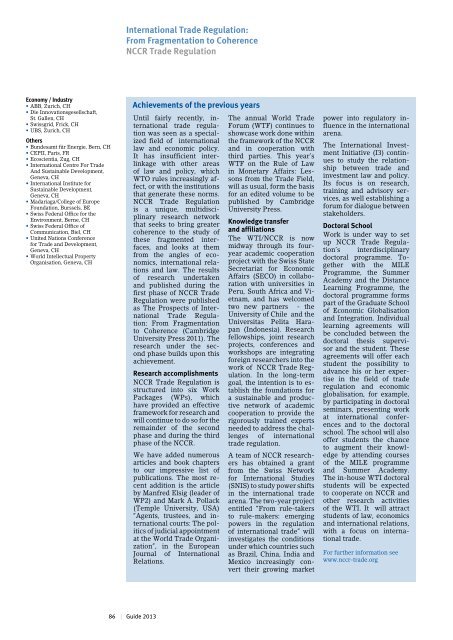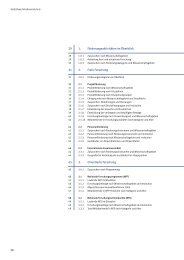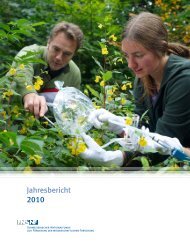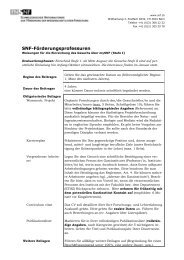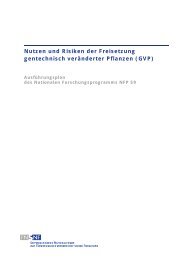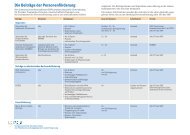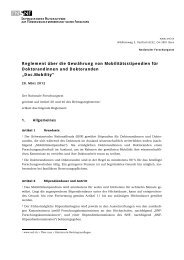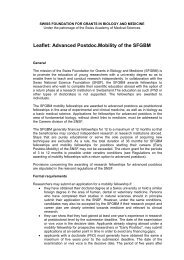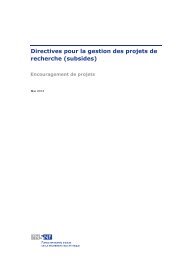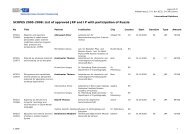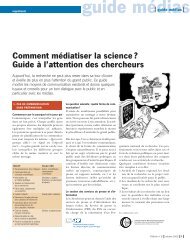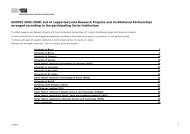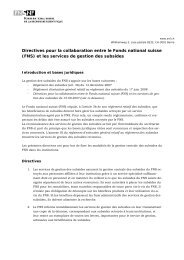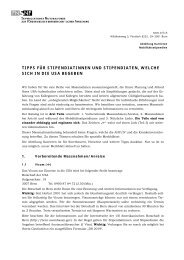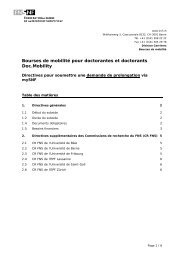NCCR Guide 2013 - Schweizerischer Nationalfonds (SNF)
NCCR Guide 2013 - Schweizerischer Nationalfonds (SNF)
NCCR Guide 2013 - Schweizerischer Nationalfonds (SNF)
Create successful ePaper yourself
Turn your PDF publications into a flip-book with our unique Google optimized e-Paper software.
International Trade Regulation:<br />
From Fragmentation to Coherence<br />
<strong>NCCR</strong> Trade Regulation<br />
Economy / Industry<br />
• ABB, Zurich, CH<br />
• Die Innovationsgesellschaft,<br />
St. Gallen, CH<br />
• Swissgrid, Frick, CH<br />
• UBS, Zurich, CH<br />
Others<br />
• Bundesamt für Energie, Bern, CH<br />
• CEPII, Paris, FR<br />
• Ecoscientia, Zug, CH<br />
• International Centre For Trade<br />
And Sustainable Development,<br />
Geneva, CH<br />
• International Institute for<br />
Sustainable Development,<br />
Geneva, CH<br />
• Madariaga/College of Europe<br />
Foundation, Burssels, BE<br />
• Swiss Federal Office for the<br />
Environment, Berne, CH<br />
• Swiss Federal Office of<br />
Communication, Biel, CH<br />
• United Nations Conference<br />
for Trade and Development,<br />
Geneva, CH<br />
• World Intellectual Property<br />
Organisation, Geneva, CH<br />
Achievements of the previous years<br />
Until fairly recently, international<br />
trade regulation<br />
was seen as a specialized<br />
field of international<br />
law and economic policy.<br />
It has insufficient interlinkage<br />
with other areas<br />
of law and policy, which<br />
WTO rules increasingly affect,<br />
or with the institutions<br />
that generate these norms.<br />
<strong>NCCR</strong> Trade Regulation<br />
is a unique, multidisciplinary<br />
research network<br />
that seeks to bring greater<br />
coherence to the study of<br />
these fragmented interfaces,<br />
and looks at them<br />
from the angles of economics,<br />
international relations<br />
and law. The results<br />
of research undertaken<br />
and published during the<br />
first phase of <strong>NCCR</strong> Trade<br />
Regulation were published<br />
as The Prospects of International<br />
Trade Regulation:<br />
From Fragmentation<br />
to Coherence (Cambridge<br />
University Press 2011). The<br />
research under the second<br />
phase builds upon this<br />
achievement.<br />
Research accomplishments<br />
<strong>NCCR</strong> Trade Regulation is<br />
structured into six Work<br />
Packages (WPs), which<br />
have provided an effective<br />
framework for research and<br />
will continue to do so for the<br />
remainder of the second<br />
phase and during the third<br />
phase of the <strong>NCCR</strong>.<br />
We have added numerous<br />
articles and book chapters<br />
to our impressive list of<br />
publications. The most recent<br />
addition is the article<br />
by Manfred Elsig (leader of<br />
WP2) and Mark A. Pollack<br />
(Temple University, USA)<br />
“Agents, trustees, and international<br />
courts: The politics<br />
of judicial appointment<br />
at the World Trade Organization”,<br />
in the European<br />
Journal of International<br />
Relations.<br />
The annual World Trade<br />
Forum (WTF) continues to<br />
showcase work done within<br />
the framework of the <strong>NCCR</strong><br />
and in cooperation with<br />
third parties. This year’s<br />
WTF on the Rule of Law<br />
in Monetary Affairs: Lessons<br />
from the Trade Field,<br />
will as usual, form the basis<br />
for an edited volume to be<br />
published by Cambridge<br />
University Press.<br />
Knowledge transfer<br />
and affiliations<br />
The WTI/<strong>NCCR</strong> is now<br />
midway through its fouryear<br />
academic cooperation<br />
project with the Swiss State<br />
Secretariat for Economic<br />
Affairs (SECO) in collaboration<br />
with universities in<br />
Peru, South Africa and Vietnam,<br />
and has welcomed<br />
two new partners - the<br />
University of Chile and the<br />
Universitas Pelita Harapan<br />
(Indonesia). Research<br />
fellowships, joint research<br />
projects, conferences and<br />
workshops are integrating<br />
foreign researchers into the<br />
work of <strong>NCCR</strong> Trade Regulation.<br />
In the long-term<br />
goal, the intention is to establish<br />
the foundations for<br />
a sustainable and productive<br />
network of academic<br />
cooperation to provide the<br />
rigorously trained experts<br />
needed to address the challenges<br />
of international<br />
trade regulation.<br />
A team of <strong>NCCR</strong> researchers<br />
has obtained a grant<br />
from the Swiss Network<br />
for International Studies<br />
(SNIS) to study power shifts<br />
in the international trade<br />
arena. The two-year project<br />
entitled “From rule-takers<br />
to rule-makers: emerging<br />
powers in the regulation<br />
of international trade” will<br />
investigates the conditions<br />
under which countries such<br />
as Brazil, China, India and<br />
Mexico increasingly convert<br />
their growing market<br />
power into regulatory influence<br />
in the international<br />
arena.<br />
The International Investment<br />
Initiative (I3) continues<br />
to study the relationship<br />
between trade and<br />
investment law and policy.<br />
Its focus is on research,<br />
training and advisory services,<br />
as well establishing a<br />
forum for dialogue between<br />
stakeholders.<br />
Doctoral School<br />
Work is under way to set<br />
up <strong>NCCR</strong> Trade Regulation’s<br />
interdisciplinary<br />
doctoral programme. Together<br />
with the MILE<br />
Programme, the Summer<br />
Academy and the Distance<br />
Learning Programme, the<br />
doctoral programme forms<br />
part of the Graduate School<br />
of Economic Globalisation<br />
and Integration. Individual<br />
learning agreements will<br />
be concluded between the<br />
doctoral thesis supervisor<br />
and the student. These<br />
agreements will offer each<br />
student the possibility to<br />
advance his or her expertise<br />
in the field of trade<br />
regulation and economic<br />
globalisation, for example,<br />
by participating in doctoral<br />
seminars, presenting work<br />
at international conferences<br />
and to the doctoral<br />
school. The school will also<br />
offer students the chance<br />
to augment their knowledge<br />
by attending courses<br />
of the MILE programme<br />
and Summer Academy.<br />
The in-house WTI doctoral<br />
students will be expected<br />
to cooperate on <strong>NCCR</strong> and<br />
other research activities<br />
of the WTI. It will attract<br />
students of law, economics<br />
and international relations,<br />
with a focus on international<br />
trade.<br />
For further information see<br />
www.nccr-trade.org<br />
86 | <strong>Guide</strong> <strong>2013</strong>


